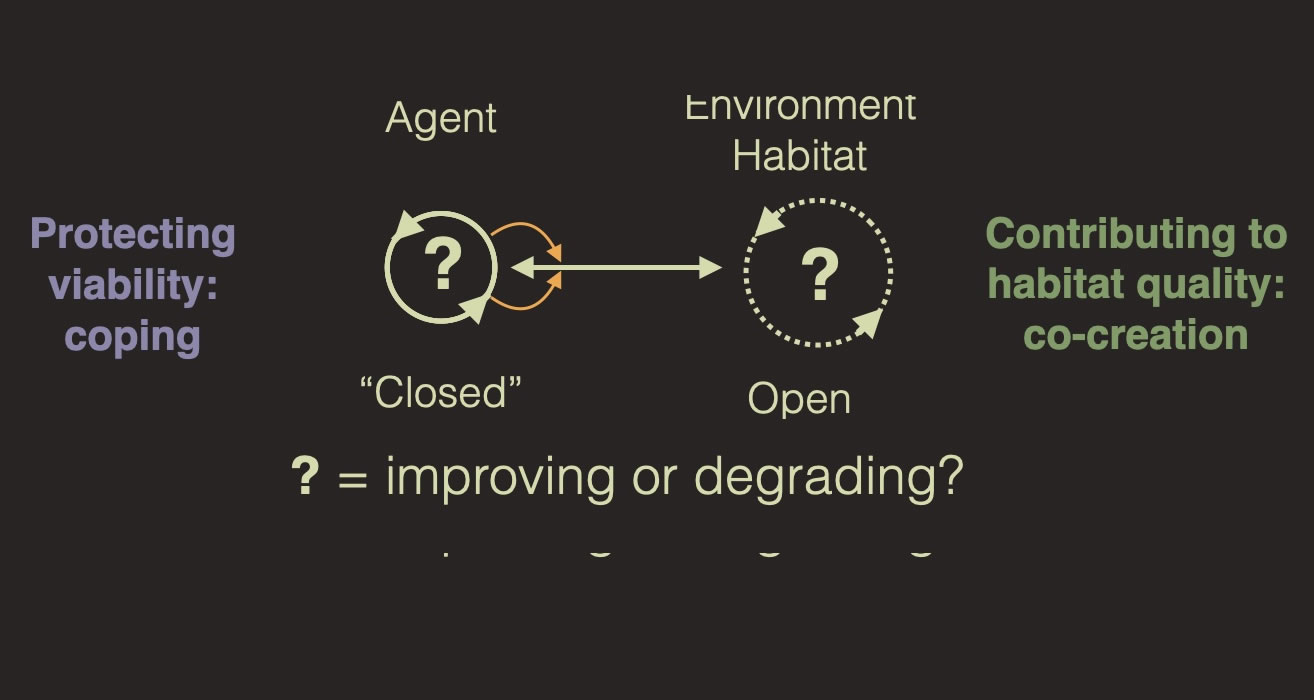
Core Cognition is the cognition shared by all of life. Core Cognition describes the basic decision making structures that allowed living agents to grow a biosphere from small and fragile to extensive, robust, incredibly diverse, and highly efficient. Core cognition describes the processes of behavior selection for survival and thriving, which is something that is relevant for all of living individuals: from bacteria to humans. But cognition for flourishing – coping – is essentially different from the cognition for survival – co-creation. This website addressed the power and consequences of this basic distinction and we argue that also human cognition (psychology) manifests core cognition in all its key properties.
Update: The first part of mass formation serves as a more concise introduction to core cognition. This text is yet another application of core cognition.
The 4 texts in this section are based on a recent paper (Andringa & Denham, 2021) in which we describe the basics of core cognition starting from the demands to being and remaining alive and maximizing viability of self and habitat. In it we derive core cognition and its two main modes, coping and co-creation, from first principles. We apply this by explaining the structure of personality and by explaining why two completely different approaches to social well-being can emerge.
With this text come two summary tables:
These texts are based on the original published version, but will deviate over time. The original version can be found here:
A combined pdf can be found here
A number of other texts are also relevant.
Andringa, T. C., Bosch, K. A. M. van den & Wijermans, N. Cognition from life: the two modes of cognition that underlie moral behavior. Frontiers in Psychology 6, 1–18 (2015).
Andringa, T. C., Bosch, K. A. M. van den & Vlaskamp, C. Learning autonomy in two or three steps: linking open-ended development, authority, and agency to motivation. Frontiers in Psychology 4, 18 (2013).
Andringa, T. C. & Angyal, N. The nature of wisdom: people’s connection to nature reflects a deep understanding of life. Psychology. Journal of the Higher School of Economics 16, 108–126 (2019).
Bosch, K. A. M. van den, Welch, D. & Andringa, T. C. The Evolution of Soundscape Appraisal Through Enactive Cognition. Frontiers in Psychology 9, 1–11 (2018).
Andringa, T. C. The Psychological Drivers of Bureaucracy: Protecting the Societal Goals of an Organization. in Policy practice and digital science : integrating complex systems, social simulation and public administration in policy research 221–260 (Policy Practice and Digital Science, 2015). doi:10.1007/978-3-319-12784-2_11.
This 4 section series is based on a recent paper (Andringa & Denham, 2021) in which we outline the basics of core cognition starting from the demands to being and remaining alive and maximizing viability of self and habitat. In it we derive core cognition and its two main modes, coping and co-creation, from first principles.

Here we develop the structure of identity in terms of coping and co-creation adequacy. This leads to an enriched understanding of the interplay between coping and co-creation, and it demonstrates that the conceptual language of core cognition is a productive lens for approaching a well-studied psychological phenomenon.

This section addresses two routes to social well-being. There are many routes to prospective well-being; in fact, all self-help literature and political, economic, or religious ideologies propose them. We have selected the “ontological security” framework and a recent formulation of “psychological safety” to represent very clear, actionable, and precisely-worded coping and co-creation alternative approaches to general well-being.
